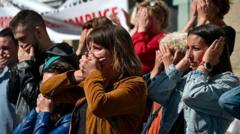As the trial of Joel Le Scouarnec draws to a close, victims express anger and frustration over the lack of public interest and demand recognition of the systemic failures that allowed the abuse to occur for decades.
Shocking Silence: Victims Demand Attention in France's Child Abuse Trial

Shocking Silence: Victims Demand Attention in France's Child Abuse Trial
In a landmark trial, Joel Le Scouarnec's victims question society's indifference to systemic child abuse in France.
In a defining moment for France’s struggle with child abuse, the trial of Joel Le Scouarnec is marked not by catharsis, but by growing frustration over a perceived societal silence regarding the plight of victims. Le Scouarnec, a retired surgeon, stands accused of perpetrating heinous crimes against 299 children, and yet the public discourse surrounding the trial lacks the robust engagement expected for such a harrowing case.
Located in Vannes, Brittany, the trial intended to shine a brilliant spotlight on issues of institutional negligence and societal indifference. However, many victims, including 36-year-old Manon Lemoine, feel they are crying out in a void. "I’m exhausted. I don’t have much hope. Society seems totally indifferent," she lamented to BBC reporters. A group formed by her and about 50 other victims has taken it upon themselves to demand accountability and recognition from the French government, branding it a "landmark" case that unveils egregious systemic failures ignored by authorities.
Despite calls for a parliamentary inquiry, the victims have questioned why the momentum seen in other prominent cases, like last year's Pelicot trial, appears to be absent here. Lemoine shared her personal struggle: "We have decided to rise up, to make our voices heard." Some victims, who initially opted for anonymity, are now stepping into the light to galvanize public sentiment and awareness around the deep-rooted cultural issues that permitted abusive practices to flourish under the supervision of respected medical professionals.
Perplexingly, many observers attribute the lack of widespread mobilization to the overwhelming nature of Le Scouarnec's crimes, further emphasized by societal discomfort when discussing child sexual abuse. Myriam Guedj-Benayoun, a lawyer for the victims, articulated a critical viewpoint of France's ingrained silence surrounding such egregious offenses, describing a "systemic, organized silence" that perpetuates these realities.
As chilling accounts unfolded during the court sessions—depicting Le Scouarnec's calculated predation on vulnerable children—victims recounted the profound emotional ramifications of their experiences. Some discovered unsettling connections between trauma and their adult lives, while others grappled with feelings of shame, guilt, and isolation.
Despite trepidation over the trial's minimal media engagement, Lemoine and other victims found solace in communal resilience, noting that the trial has allowed them to share their narratives and bond over common trauma. "This trial has turned out to be liberating," Lemoine remarked, underscoring the potential for healing even in such tragic circumstances.
As Le Scouarnec’s sentencing looms—likely resulting in a lifetime behind bars—child rights advocates, including NGO founder Arnaud Gallais, call for united efforts to confront and rectify systemic failures. "We have to react… otherwise, nothing will happen, and the trial will have served no purpose," he urged. Meanwhile, Guedj-Benayoun cautioned that the outcome remains uncertain, reflecting the ongoing battle between those striving to expose child sexual violence and others who prefer silence.
This trial poses profound questions for French society about the awareness and acknowledgment of child abuse, highlighting a critical need for a collective reckoning and a cultural shift.




















